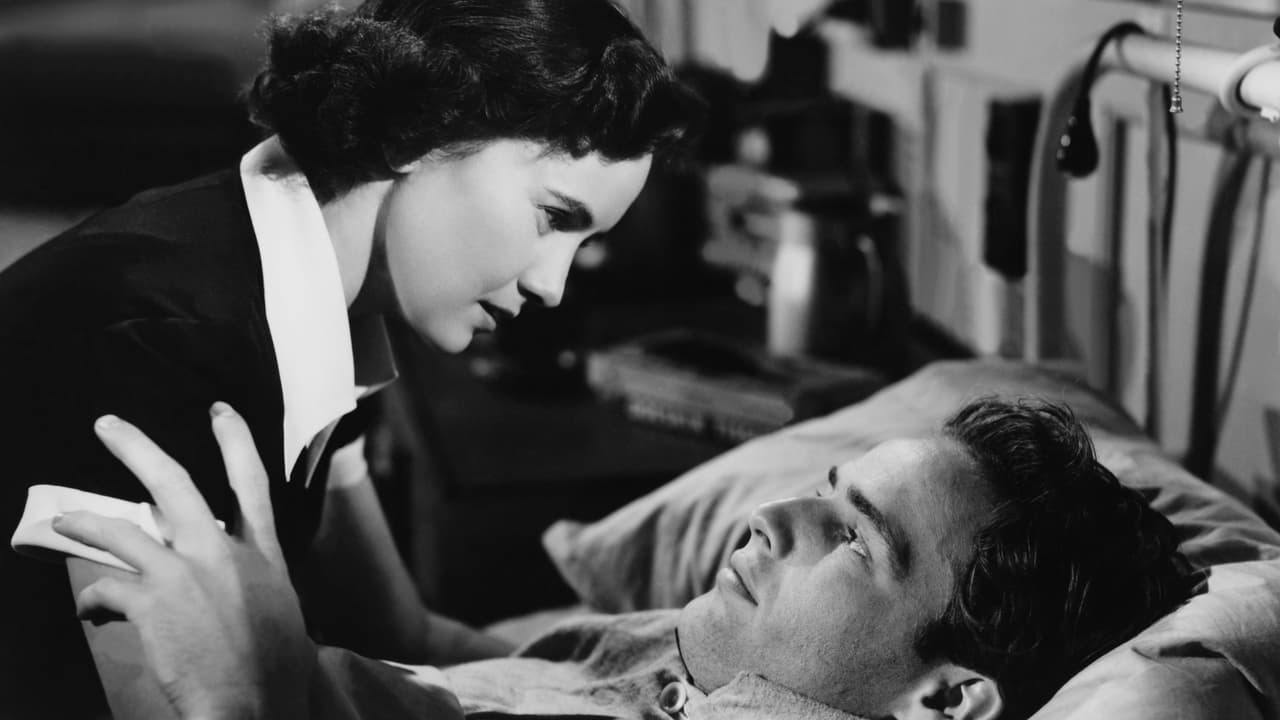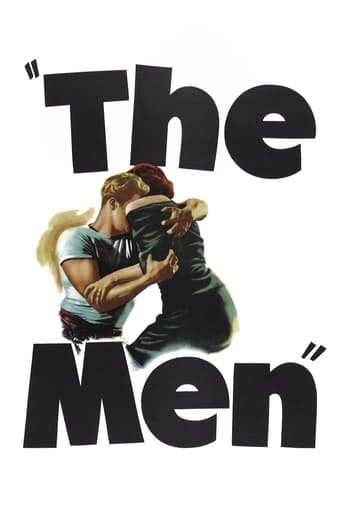

Fred Zinnemann, born in Austria-Hungary, was very interested in the neo- realist movement of Italian cinema and its raw approach to reality. After making numerous films in Hollywood, he finally directed "The Men" (1950) which is arguably the closest he ever got to the style of the era. Knowing the neo-realist movement and its style, it's no wonder that the icon of post-war youth and its rebellion, Marlon Brando, did his debut performance in the film. What is more, one can truly observe Zinnemann's great fascination for documentary in "The Men". In fact, without the romantic subplot the film could be seen as a (neo)-realist reportage of the bleak reality of the war veterans' hospitals. On the other hand, the love story, represented by Marlon Brando and Teresa Wright, gives depth to the drama and, all in all, a new dimension to the film. "The Men" begins with a flashback sequence where men are strolling the paths of glory toward the fortress of doom. The protagonist recalls his accident which led to his paralysis: "I was afraid I was going to die. Now I'm afraid I'm going to live." Thus starts the tale of an individual's painful journey from desperate denial to acceptance of one's own condition and physical restriction.In addition to the neo-realist aesthetics, the documentary-like nature of the film is revealed in its honesty. Beside themes of readjustment and human fragility, many critics have commended the film's ability to discuss the sexual problems of paraplegic men, though rather subtly. My biggest complaint regarding the stylistics of the film is the musical score composed by the talented Max Steiner. All in all, his flamboyant score does not fit a film which has been stripped from all excessive decoration. The score feels strange, as if added from the outside, in the nearly Bressonian aesthetics. Alfred Hitchcock's "The Wrong Man" (1956) suffered from similar treatment. To my mind, "The Men" didn't need a score at all — or at least it could have done better with a restrained soundtrack.Fortunately, music is just one element in "The Men". Discussing the film, it is essential to take its title in consideration. For "The Men" is truly a film about the men who came back from the war to fight another. Although the focus isn't as social as in "The Best Years of Our Lives" (1945), for instance, the film shouldn't be blamed for thematic thinness. The title refers to the characters, the young men, who fought in the front and now continue the inner war with themselves. They experience severe social pressure for not fitting in and losing their manhood.One element which fascinated Zinnemann about neo-realism was its tradition of filming in the streets. Partially due to this, "The Men" is filmed in an actual veterans' hospital. According to what I've read, Zinnemann and Brando spent a few weeks at the hospital before shooting and became a part of its environment. In fact, many of the patients are in the finished film as characters. As a consequence, an emotion of solidarity and authentic care exhales from the film that salutes to endurance and triumph over physical obstacles. If "The Men" is stylistic, touching and well crafted altogether, what then truly separates it from the rest? For example, "Hôtel des Invalides" (1952), "Johnny Got His Gun" (1971) and "Born on the Fourth of July" (1989) all deal with war veterans' paralysis and readjustment or its failure in a more or less original fashion. Yet, if Franju's film is poignant and intelligent, Trumbo's nihilist and Wood's biographical — all of them being uncompromisingly pacifistic — Zinnemann's film is, above all, emotional. By saying this I am not, however, referring to the romantic subplot of "The Men", but to its great humanism.
... View MoreA fantastic film, and a very important one, based on the story of Carl Foreman (who's screenplay was nominated for an Oscar). Actors and and real veterans portray men/soldiers, who were injured during war. Everyone especially Marlon Brando, who plays Ken and is paralyzed below the waist, gave a superb performance.I could quote the whole film, there are just so many good moments! They know they will never walk again, but that doesn't hold them from living their lives. They joke around with the doctors, with the nursers and make fun of each other. Of course there are also the sad and depressing moments, i.e. when they realize they will never have children, or their wives want to get divorced, they stop loving themselves and hate the fact they need help from others. I'd say "The Men" is a classic everyone can watch, even if it's just to see Marlon Brando (who allegedly lay in a bed in a veterans' hospital for a month to to prepare for his role as paraplegic) at the beginning of his wonderful career.
... View MoreIn "The Best Years of Our Lives (1946) Harold Russell (a real life war veteran) has lost the lower part of his arms in the US Navy after a fire broke out on his flat top ship whilst he was on active service.His childhood girlfriend, (Cathy O'Donnell) shows that her love for him transcends his physical injury and they marry after much soul-searching by Harold.A similar story is told in "The Men" (1950) this time with Marlon Brando playing the paraplegic soldier with the faithful fiancée played by Teresa Wright (who also appeared in the aforementioned film).Society's prejudiced attitude to permanently injured members of the armed forces is again examined."They imagine how fragile they are and how it could so easily happen to them.It makes them nervous".In an almost duplicate scene of the 1946 film, the actor Ray Teal is again called on to patronise and express the futility of permanently injured members of the armed forces and he is again punched to the ground, in the 1946 film by Dana Andrews and in this film by a wheelchair bound Marlon Brando.The actor Everett Sloane probably never had such a good part as playing the senior doctor who administers the treatment of the injured veterans at his hospital.His talk to Marlon was prescient about the men trying to visualise the scenario reversed by the men imagining their wife/fiancée/girlfriend confined to a wheelchair and testing their love accordingly.We are all human with all the imperfection that implies.This film has a powerful director in Fred Zinneman and a script by Carl Foreman.I liked the way that they carefully avoided the use of clichés and portrayed realistic emotions in all the actors.Real life paraplegics at the veterans hospital, played extras and received a credit in the film titles.We must never forget the sacrifice all members of the armed services personnel lay down in accepting permanent life-long physical injuries sustained in action for their country.
... View MoreThe premise of the film appealed to me, and then I found out this was debut film for one of Hollywood's greatest stars, if not the greatest movie actor of all time, from director Fred Zinnemann (High Noon, From Here to Eternity). The film opens with the lead character Ken 'Bud' Wilozek (Marlon Brando) in battle, most likely how he got paralysed, that is what the story focuses on, a hospital for many other paraplegics like him. Basically Bud was to be married to Ellen 'Elly' (Teresa Wright), but after a year of being paralysed, he hasn't changed his mind on not wanting that anymore, and wanting to live pretty much in seclusion. Ellen does manage to find him, and she does talk him into make some changes, including more exercise, and I guess, trying to get walk again. Eventually, he decides to let him back into his life, and they do get married after all, there is a point where she wonders if she made the right decision, but don't worry, everything settles in the end. Also starring Everett Sloane as Dr. Eugene 'Gene' Brock, Jack Webb as Norm Butler, Richard Erdman as Leo Doolin, Arthur Jurado as Angel Lopez, Virginia Farmer as Nurse Robbins, Dorothy Tree as Harriet - Ellen's mother, Howard St. John as Ellen's father, Nita Hunter as Dolores, Patricia Joiner as Laverne, John 'Skins' Miller as Mr. Doolin, Cliff Clark as Dr. Kameran. Brando is extraordinary in his very first role, coming from Broadway, and Wright offers very good support as his fiancée, and the story has a lot of merit, a fantastic drama film. It was nominated the Oscar for Best Writing, Story and Screenplay for Carl Foreman, and it was nominated the BAFTA Film for Best Film from any Source. Marlon Brando was number 30 on The 100 Greatest Movie Stars, he was number 11 on The 100 Greatest Sex Symbols, he was number 4 on 100 Years, 100 Stars - Men, and he was number 1 on The World's Greatest Actor. Very good!
... View More